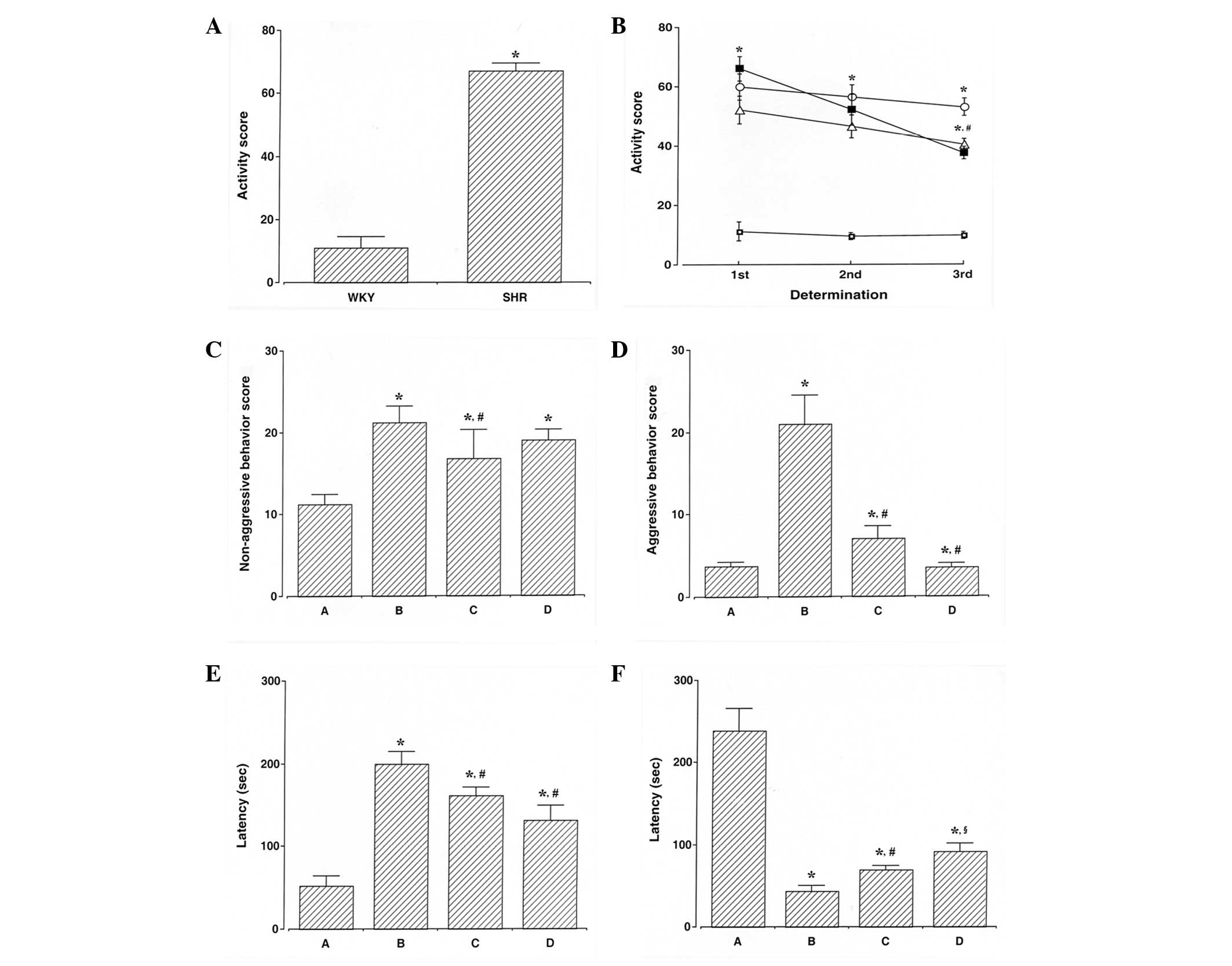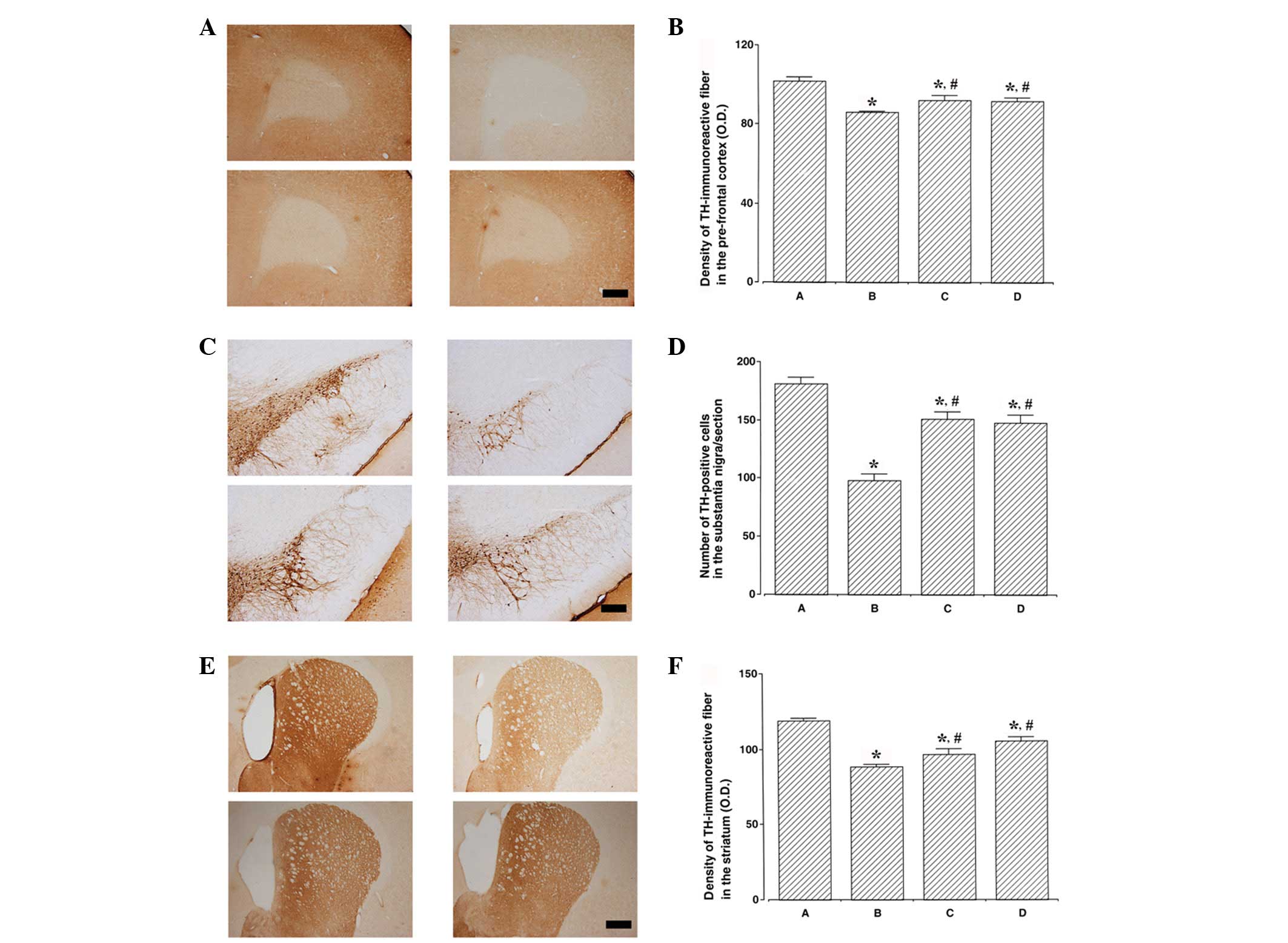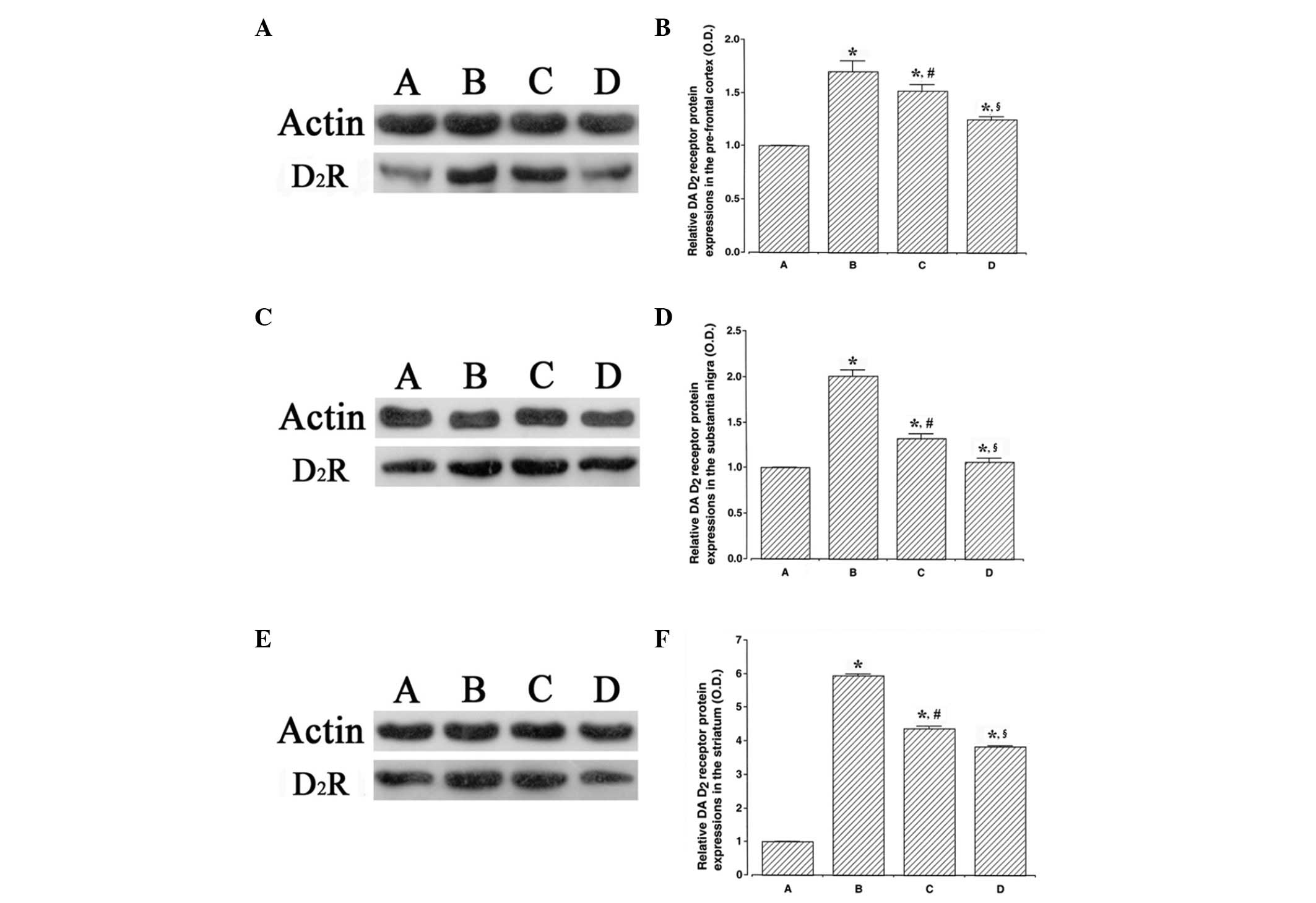|
1
|
Scahill L and Schwab-Stone M: Epidemiology
of ADHD in school-age children. Child Adolesc Psychiatr Clin N Am.
9:541–555. 2000.PubMed/NCBI
|
|
2
|
Arnsten AF: Fundamentals of
attention-deficit/hyperactivity disorder: circuits and pathways. J
Clin Psychiatry. 67(Suppl 8): 7–12. 2006.PubMed/NCBI
|
|
3
|
Bowton E, Saunders C, Erreger K, Sakrikar
D, Matthies HJ, Sen N, Jessen T, Colbran RJ, Caron MG, Javitch JA,
Blakely RD and Galli A: Dysregulation of dopamine transporters via
dopamine D2 autoreceptors triggers anomalous dopamine efflux
associated with attention-deficit hyperactivity disorder. J
Neurosci. 30:6048–6057. 2010. View Article : Google Scholar
|
|
4
|
Palmiter RD: Dopamine signaling in the
dorsal striatum is essential for motivated behaviors: lessons from
dopamine-deficient mice. Ann NY Acad Sci. 1129:35–46. 2008.
View Article : Google Scholar : PubMed/NCBI
|
|
5
|
Castellanos FX and Tannock R: Neuroscience
of attention-deficit/hyperactivity disorder: the search for
endophenotypes. Nat Rev Neurosci. 3:617–628. 2002. View Article : Google Scholar : PubMed/NCBI
|
|
6
|
Winstanley CA, Eagle DM and Robbins TW:
Behavioral models of impulsivity in relation to ADHD: translation
between clinical and preclinical studies. Clin Psychol Rev.
26:379–395. 2006. View Article : Google Scholar : PubMed/NCBI
|
|
7
|
Hu Z, Cooper M, Crockett DP and Zhou R:
Differentiation of the midbrain dopaminergic pathways during mouse
development. J Comp Neurol. 476:301–311. 2004. View Article : Google Scholar : PubMed/NCBI
|
|
8
|
Kaplan RF and Stevens M: A review of adult
ADHD: a neuropsychological and neuroimaging perspective. CNS
Spectr. 7:355–362. 2002.PubMed/NCBI
|
|
9
|
Volkow ND, Wang GJ, Fowler JS and Ding YS:
Imaging the effects of methylphenidate on brain dopamine: new model
on its therapeutic actions for attention-deficit/hyperactivity
disorder. Biol Psychiatry. 57:1410–1415. 2005. View Article : Google Scholar : PubMed/NCBI
|
|
10
|
Yoon MC, Shin MS, Kim TS, Kim BK, Ko IG,
Sung YH, Kim SE, Lee HH, Kim YP and Kim CJ: Treadmill exercise
suppresses nigrostriatal dopaminergic neuronal loss in
6-hydroxydopamine-induced Parkinson’s rats. Neurosci Lett.
423:12–17. 2007.PubMed/NCBI
|
|
11
|
Haavik J and Toska K: Tyrosine hydroxylase
and Parkinson’s disease. Mol Neurobiol. 16:285–309. 1998.
|
|
12
|
Hurley FM, Costello DJ and Sullivan AM:
Neuroprotective effects of delayed administration of
growth/differentiation factor-5 in the partial lesion model of
Parkinson’s disease. Exp Neurol. 185:281–289. 2004.PubMed/NCBI
|
|
13
|
Ko IG, Cho H, Kim SE, Kim JE, Sung YH, Kim
BK, Shin MS, Cho S, Pak YK and Kim CJ: Hypothermia alleviates
hypoxic ischemia-induced dopamine dysfunction and memory impairment
in rats. Anim Cells Syst. 15:279–286. 2011. View Article : Google Scholar
|
|
14
|
Millan MJ, Seguin L, Gobert A, Cussac D
and Brocco M: The role of dopamine D3 compared with D2 receptors in
the control of locomotor activity: a combined behavioural and
neurochemical analysis with novel, selective antagonists in rats.
Psychopharmacology (Berl). 174:341–357. 2004. View Article : Google Scholar : PubMed/NCBI
|
|
15
|
Pirke KM, Broocks A, Wilckens T, Marquard
R and Schweiger U: Starvation-induced hyperactivity in the rat: the
role of endocrine and neurotransmitter changes. Neurosci Biobehav
Rev. 17:287–294. 1993. View Article : Google Scholar : PubMed/NCBI
|
|
16
|
Volkow ND, Wang GJ, Newcorn J, Telang F,
Solanto MV, Fowler JS, Logan J, Ma Y, Schulz K, Pradhan K, Wong C
and Swanson JM: Depressed dopamine activity in caudate and
preliminary evidence of limbic involvement in adults with
attention-deficit/hyperactivity disorder. Arch Gen Psychiatry.
64:932–940. 2007. View Article : Google Scholar : PubMed/NCBI
|
|
17
|
Wang M, Pei L, Fletcher PJ, Kapur S,
Seeman P and Liu F: Schizophrenia, amphetamine-induced sensitized
state and acute amphetamine exposure all show a common alteration:
increased dopamine D2 receptor dimerization. Mol Brain. 3:252010.
View Article : Google Scholar
|
|
18
|
Gründer G: Cariprazine, an orally active
D2/D3 receptor antagonist, for the potential treatment of
schizophrenia, bipolar mania and depression. Curr Opin Investig
Drugs. 11:823–832. 2010.PubMed/NCBI
|
|
19
|
Fasano C, Poirier A, DesGroseillers L and
Trudeau LE: Chronic activation of the D2 dopamine autoreceptor
inhibits synaptogenesis in mesencephalic dopaminergic neurons in
vitro. Eur J Neurosci. 28:1480–1490. 2008. View Article : Google Scholar : PubMed/NCBI
|
|
20
|
Chausmer AL, Elmer GI, Rubinstein M, Low
MJ, Grandy DK and Katz JL: Cocaine-induced locomotor activity and
cocaine discrimination in dopamine D2 receptor mutant mice.
Psychopharmacology (Berl). 163:54–61. 2002. View Article : Google Scholar : PubMed/NCBI
|
|
21
|
Sevak RJ, Owens WA, Koek W, Galli A, Daws
LC and France CP: Evidence for D2 receptor mediation of
amphetamine-induced normalization of locomotion and dopamine
transporter function in hypoinsulinemic rats. J Neurochem.
101:151–159. 2007. View Article : Google Scholar : PubMed/NCBI
|
|
22
|
Tanabe LM, Suto N, Creekmore E,
Steinmiller CL and Vezina P: Blockade of D2 dopamine receptors in
the VTA induces a long-lasting enhancement of the locomotor
activating effects of amphetamine. Behav Pharmacol. 15:387–395.
2004. View Article : Google Scholar : PubMed/NCBI
|
|
23
|
Banaschewski T, Roessner V, Dittmann RW,
Santosh PJ and Rothenberger A: Non-stimulant medications in the
treatment of ADHD. Eur Child Adolesc Psychiatry. 13(Suppl 1):
i102–i116. 2004. View Article : Google Scholar : PubMed/NCBI
|
|
24
|
Bymaster FP, Katner JS, Nelson DL,
Hemrick-Luecke SK, Threlkeld PG, Heiligenstein JH, Morin SM,
Gehlert DR and Perry KW: Atomoxetine increases extracellular levels
of norepinephrine and dopamine in prefrontal cortex of rat: a
potential mechanism for efficacy in attention deficit/hyperactivity
disorder. Neuropsychopharmacology. 27:699–711. 2002. View Article : Google Scholar
|
|
25
|
Cascade E, Kalali AH and Wigal SB:
Real-world data on: attention deficit hyperactivity disorder
medication side effects. Psychiatry (Edgmont). 7:13–15.
2010.PubMed/NCBI
|
|
26
|
Jee YS, Ko IG, Sung YH, Lee JW, Kim YS,
Kim SE, Kim BK, Seo JH, Shin MS, Lee HH, Cho HJ and Kim CJ: Effects
of treadmill exercise on memory and c-Fos expression in the
hippocampus of the rats with intracerebroventricular injection of
streptozotocin. Neurosci Lett. 443:188–192. 2008. View Article : Google Scholar : PubMed/NCBI
|
|
27
|
Kim SE, Ko IG, Kim BK, Shin MS, Cho S, Kim
CJ, Kim SH, Baek SS, Lee EK and Jee YS: Treadmill exercise prevents
aging-induced failure of memory through an increase in neurogenesis
and suppression of apoptosis in rat hippocampus. Exp Gerontol.
45:357–365. 2010. View Article : Google Scholar : PubMed/NCBI
|
|
28
|
Kim SE, Ko IG, Park CY, Shin MS, Kim CJ
and Jee YS: Treadmill and wheel exercise alleviate
lipopolysaccharide-induced short-term memory impairment by
enhancing neuronal maturation in rats. Mol Med Rep. 7:37–42.
2013.PubMed/NCBI
|
|
29
|
O’Dell SJ, Gross NB, Fricks AN, Casiano
BD, Nguyen TB and Marshall JF: Running wheel exercise enhances
recovery from nigrostriatal dopamine injury without inducing
neuroprotection. Neuroscience. 144:1141–1151. 2007.PubMed/NCBI
|
|
30
|
Majorek M, Tüchelmann T and Heusser P:
Therapeutic Eurythmy-movement therapy for children with attention
deficit hyperactivity disorder (ADHD): a pilot study. Complement
Ther Nurs Midwifery. 10:46–53. 2004. View Article : Google Scholar : PubMed/NCBI
|
|
31
|
Kim H, Heo HI, Kim DH, Ko IG, Lee SS, Kim
SE, Kim BK, Kim TW, Ji ES, Kim JD, Shin MS, Choi YW and Kim CJ:
Treadmill exercise and methylphenidate ameliorate symptoms of
attention deficit/hyperactivity disorder through enhancing dopamine
synthesis and brain-derived neurotrophic factor expression in
spontaneous hypertensive rats. Neurosci Lett. 504:35–39. 2011.
View Article : Google Scholar
|
|
32
|
Baron DA: The gold medal face of ADHD. J
Atten Disord. 13:323–324. 2010. View Article : Google Scholar : PubMed/NCBI
|
|
33
|
Sagvolden T: Behavioral validation of the
spontaneously hypertensive rat (SHR) as an animal model of
attention-deficit/hyperactivity disorder (AD/HD). Neurosci Biobehav
Rev. 24:31–39. 2000. View Article : Google Scholar : PubMed/NCBI
|
|
34
|
Prediger RD, Pamplona FA, Fernandes D and
Takahashi RN: Caffeine improves spatial learning deficits in an
animal model of attention deficit hyperactivity disorder (ADHD) -
the spontaneously hypertensive rat (SHR). Int J
Neuropsychopharmacol. 8:583–594. 2005. View Article : Google Scholar
|
|
35
|
Kim K, Chung E, Kim CJ and Lee S: Swimming
exercise during pregnancy alleviates pregnancy-associated long-term
memory impairment. Physiol Behav. 107:82–86. 2012. View Article : Google Scholar : PubMed/NCBI
|
|
36
|
Dandekar MP, Singru PS, Kokare DM, Lechan
RM, Thim L, Clausen JT and Subhedar NK: Importance of cocaine- and
amphetamine-regulated transcript peptide in the central nucleus of
amygdala in anxiogenic responses induced by ethanol withdrawal.
Neuropsychopharmacology. 33:1127–1136. 2008. View Article : Google Scholar
|
|
37
|
Seo JH, Kim TW, Kim CJ, Sung YH and Lee
SJ: Treadmill exercise during pregnancy ameliorates post-traumatic
stress disorder-induced anxiety-like responses in maternal rats.
Mol Med Rep. 7:389–395. 2013.PubMed/NCBI
|
|
38
|
Sagvolden T, Russell VA, Aase H, Johansen
EB and Farshbaf M: Rodent models of attention-deficit/hyperactivity
disorder. Biol Psychiatry. 57:1239–1247. 2005. View Article : Google Scholar : PubMed/NCBI
|
|
39
|
Devilbiss DM and Berridge CW:
Cognition-enhancing doses of methylphenidate preferentially
increase prefrontal cortex neuronal responsiveness. Biol
Psychiatry. 64:626–635. 2008. View Article : Google Scholar : PubMed/NCBI
|
|
40
|
Heal DJ, Smith SL, Kulkarni RS and Rowley
HL: New perspectives from microdialysis studies in freely-moving,
spontaneously hypertensive rats on the pharmacology of drugs for
the treatment of ADHD. Pharmacol Biochem Behav. 90:184–197. 2008.
View Article : Google Scholar : PubMed/NCBI
|
|
41
|
Mabandla MV, Kellaway LA, Daniels WM and
Russell VA: Effect of exercise on dopamine neuron survival in
prenatally stressed rats. Metab Brain Dis. 24:525–539. 2009.
View Article : Google Scholar : PubMed/NCBI
|
|
42
|
Sung YH, Kim SC, Hong HP, Park CY, Shin
MS, Kim CJ, Seo JH, Kim DY, Kim DJ and Cho HJ: Treadmill exercise
ameliorates dopaminergic neuronal loss through suppressing
microglial activation in Parkinson’s disease mice. Life Sci.
91:1309–1316. 2012.PubMed/NCBI
|
|
43
|
Dey S and Singh RH: Modification of
apomorphine-induced behaviour following chronic swim exercise in
rats. Neuroreport. 3:497–500. 1992. View Article : Google Scholar : PubMed/NCBI
|
|
44
|
Miczek KA, Fish EW, De Bold JF and De
Almeida RM: Social and neural determinants of aggressive behavior:
pharmacotherapeutic targets at serotonin, dopamine and
gamma-aminobutyric acid systems. Psychopharmacology (Berl).
163:434–458. 2002. View Article : Google Scholar : PubMed/NCBI
|
|
45
|
Jucaite A, Fernell E, Halldin C, Forssberg
H and Farde L: Reduced midbrain dopamine transporter binding in
male adolescents with attention-deficit/hyperactivity disorder:
association between striatal dopamine markers and motor
hyperactivity. Biol Psychiatry. 57:229–238. 2005. View Article : Google Scholar
|
|
46
|
Eagle DM, Wong JC, Allan ME, Mar AC,
Theobald DE and Robbins TW: Contrasting roles for dopamine D1 and
D2 receptor subtypes in the dorsomedial striatum but not the
nucleus accumbens core during behavioral inhibition in the
stop-signal task in rats. J Neurosci. 31:7349–7356. 2011.
View Article : Google Scholar : PubMed/NCBI
|
|
47
|
Wang Y, Sasaoka T and Dang MT: A molecular
genetic approach to uncovering the differential functions of
dopamine D2 receptor isoforms. Methods Mol Biol. 964:181–200. 2013.
View Article : Google Scholar : PubMed/NCBI
|
|
48
|
Klinker F, Hasan K, Paulus W, Nitsche MA
and Liebetanz D: Pharmacological blockade and genetic absence of
the dopamine D2 receptor specifically modulate voluntary locomotor
activity in mice. Behav Brain Res. 242:117–124. 2013. View Article : Google Scholar : PubMed/NCBI
|

















